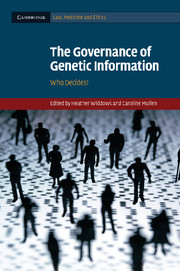Book contents
- Frontmatter
- Contents
- Notes on contributors
- Preface
- Introduction
- SECTION I Problematising governance of genetic information
- 1 The medium and the message: tissue samples, genetic information and data protection legislation
- 2 Me, myself, I – against narcissism in the governance of genetic information
- 3 Decisions, consent and expectations of the individual
- SECTION II Ethical frameworks of governance
- SECTION III Redesigning governance
- Bibliography
- Index
3 - Decisions, consent and expectations of the individual
Published online by Cambridge University Press: 02 February 2010
- Frontmatter
- Contents
- Notes on contributors
- Preface
- Introduction
- SECTION I Problematising governance of genetic information
- 1 The medium and the message: tissue samples, genetic information and data protection legislation
- 2 Me, myself, I – against narcissism in the governance of genetic information
- 3 Decisions, consent and expectations of the individual
- SECTION II Ethical frameworks of governance
- SECTION III Redesigning governance
- Bibliography
- Index
Summary
Recognising the potential contribution of genetic research in treating illness, improving health and saving lives, arbiters of ethical standards such as UNESCO have supported the collection of donated tissue samples and related genetic information for use in medical research. This support is tightly bound with the condition that human tissue samples and associated genetic information should be used only with the informed consent of the persons from whom they came. Its role in research which might improve health and lives means that donation can be considered commendable or generous, especially in circumstances where the donors can expect no direct or immediate personal benefit from their participation in research (as is the case for donations made to biobanks). However, with few exceptions, these ethical standards are silent on questions of whether people have any moral duty to participate in research or whether there are moral considerations that people can be expected to consider in deciding whether to participate in research. Consequently, beyond possible commendation for those who decide to undertake a generous act of donation, the ethical standards do not imply that there is room for any further moral judgement of people's decisions. The situation is different in wider ethical debate where the case has been made for moral assessment of people's decisions about allowing tissue samples and related information to be used in research. Knoppers and Chadwick point to trends of understanding donation for research in the contexts of reciprocity, mutuality, solidarity, citizenry or universality, and Harris has made the case for an obligation to participate in medical research.
- Type
- Chapter
- Information
- The Governance of Genetic InformationWho Decides?, pp. 51 - 72Publisher: Cambridge University PressPrint publication year: 2009
- 1
- Cited by

